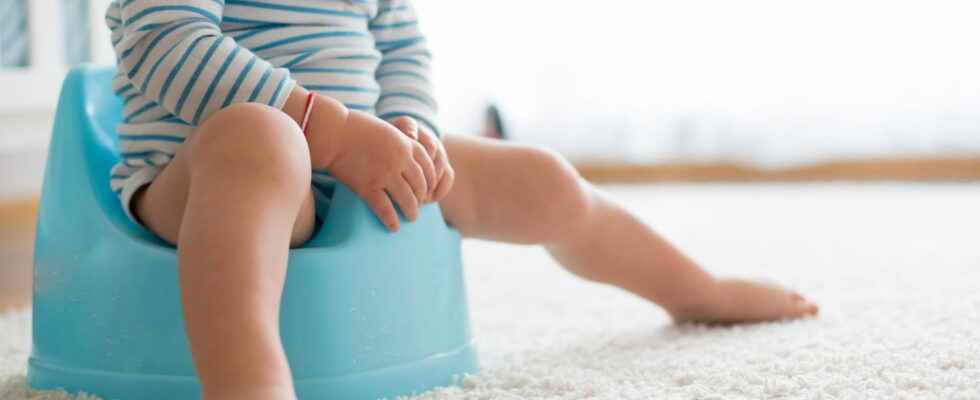Your child is growing up and you would like him to do without his nappies? Parents often take advantage of the summer holidays to teach their child cleanliness by suggesting that they go to the potty, like the grown-ups. Our advice and tips to help him pass this course smoothly.
Potty training is an essential stage in the development of the child. If your baby accepts the idea of leaving his diapers to favor the pot, you have everything to gain, especially if your little one is going back to school for the first time in September. But be careful not to force his hand: you will have to arm yourself with patience and waiting for the child to be ready for the potty. So how to go about it and at what age to start potty training ? Waiting for the right moment, suggesting and making proposals, valuing him when he agrees to pee on the pot, leading by example, and showing psychology are in order… Our tips and tricks to help him get clean:
Toilet training: at what age?
Potty training is usually done between 2 and 3 years old, especially when the child feels ready. It’s actually a function of the maturity of the child’s brain, i.e. between 18 and 24 months, that it can become clean. So don’t start too early.”To get an idea, your child is potty trained when he is able to walk up and down the stairs on his own“says Hélène Romano, psychologist.
What are the risks of starting the pot too early or too late?
According to one american studyI’early toilet trainingbefore the age of two years, could lead to incontinence and constipation problems. Same thing for children who used the pot late. To reach this conclusion, researchers from Wake Forest University in the United States followed 112 children aged 3 to 10, most of whom already had incontinence problems. Result: 60% of children who peed in the potty before the age of 2 had leakage problems during the day. In addition, compared to normal potty training, this risk of incontinence is multiplied by three, as is the problem of constipation. As for those who used the pot after 3 years, researchers find the same problems. In question ? Potty-trained children learn to hold back even as their bladders grow. Thus, the habit of retention of stool and urine leads to dysfunction in urination. The researchers then recommend using nappies until the age of two to allow the child’s bladder and transit to develop properly.
Which potty to choose for baby?
For Dr. Willig, pediatrician and member of the French Association of Ambulatory Pediatrics (AFPA), the impatience of parents who encourage their child to go potty is not effective. “When it comes to cleanliness, the most important issue is stillobserve the child without putting pressure on him, by identifying the moment when he will have fun sitting on the potty to do like the others, then the moment when he will clearly feel the need to pee or poop, by stopping or by changing behavior. At this point, the parents can then take the diaper off and put it on the potty.” advises the specialist.
What tricks are effective in helping him become potty trained?
Some parents, for example, choose to draw a sun as soon as the child uses the potty so that he is proud to go there on his own afterwards. Others choose an original and playful potty, which makes the child want to leave their diapers… In his book “My child is not yet clean: 1 problem, 7 solutions”, Dr Arnault Pfersdorff helps parents to understand why children refuse to take off their diapers, but above all it provides advice on how to prevent all types of accidents and help them become clean, day and night.
